Search Results
Showing results 41 to 60 of 395

Seeing Your Retina
Source Institutions
In this quick optics activity, learners use a dim point of light (a disassembled Mini MagLite and dowel set-up) to cast a shadow of the blood supply in their retina onto the retina itself.
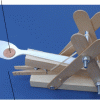
Catapult
Source Institutions
In this activity, learners construct their own small catapults using simple materials. Learners follow visual instructions to build their launching device.
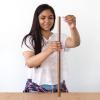
Eddy Currents
Source Institutions
In this activity related to magnetism and electricity, learners discover that a magnet falls more slowly through a metallic tube than it does through a nonmetallic tube.
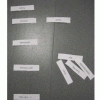
Life Size: Line 'em up!
Source Institutions
In this activity on page 1 of the PDF, learners compare the relative sizes of biological objects (like DNA and bacteria) that can't be seen by the naked eye.
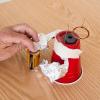
Stripped-down Motor
Source Institutions
In this activity, you'll make an electric motor--a simple version of the electric motors found in toys, tools, and appliances everywhere.
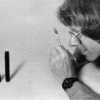
Diffraction
Source Institutions
In this optics activity, demonstrate diffraction using a candle or a small bright flashlight bulb and a slide made with two pencils.
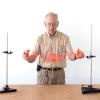
Slinky in Hand: Make waves without getting wet
Source Institutions
Play with a slinky and make transverse waves. In this simple Exploratorium Science Snack, learners will experience making waves and will learn the different parts of a wave.
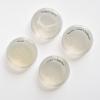
Salty Pits
Source Institutions
In this activity, learners explore how different deodorants work. Learners treat agar plates with different types of deodorants and compare the bacteria growth on the plates to the control sample.
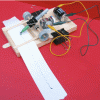
Paper Tape Motion Timer
Source Institutions
In this activity, learners build a recording timer made from simple materials (e.g., small dc motor, sharpie pen, craft sticks, adding machine paper tape, etc.).
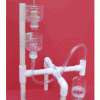
Toilet Model
Source Institutions
In this activity, PVC pipe, plastic water bottles and vinyl tubing are used to make a simple working toilet model. The model shows the role of a siphon in the flushing of a toilet.

Paper Airplanes
Source Institutions
In this activity, learners explore the properties of paper by constructing and modifying paper airplanes.

Sweetly Balanced Equations
Source Institutions
In this (edible) activity, learners balance chemical equations using different kinds and colors of candy that represent different atoms. Learners will work in pairs and explore conservation of atoms.
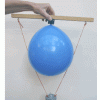
Springs and Stomachs
Source Institutions
In this demonstration, learners investigate mass, gravity, and acceleration by dropping a wooden bar with a balloon attached to its underside, a mass suspended from it by rubber bands, and a sharp-poi
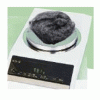
Fast Rusting
Source Institutions
In this activity, learners conduct an experiment to find out if steel wool will weigh more or less when it is burned. Learners will explore the effects of oxidation and rusting on the steel wool.

Your Father's Nose
Source Institutions
In this fun optics activity, learners explore principles of light, reflection (mirrors), and perception. Learners work in pairs and sit on opposite sides of a "two-way" mirror.

Mold Mole Molds
Source Institutions
In this activity, learners make different shapes that hold exactly one mole of gas (air).

Black Magic (Color Chromatography)
Source Institutions
With a coffee filter, a black marker, and a cup of water, discover the secret colors hidden in black ink.
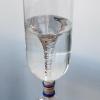
Vortex
Source Institutions
In this activity, learners create a tornado in a bottle to observe a spiraling, funnel-shaped vortex. A simple connector device allows water to drain from a 2-liter bottle into a second bottle.

Mold Terrarium: What Grows on Leftover Food?
Source Institutions
This activity shows you how to make a mold terrarium using a jar and leftover food.
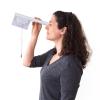
Height Sight
Source Institutions
In this activity, learners build a tool called an inclinometer that can find the height of any distant object, from a tree to the North Star.
